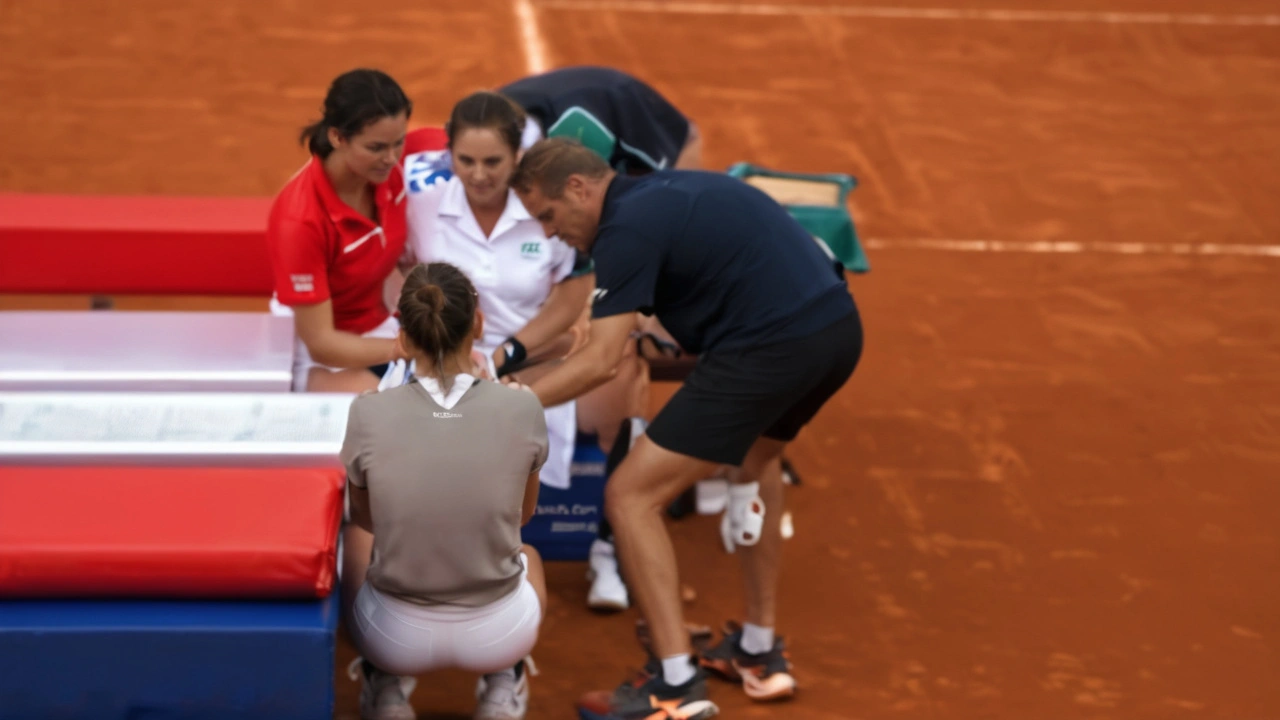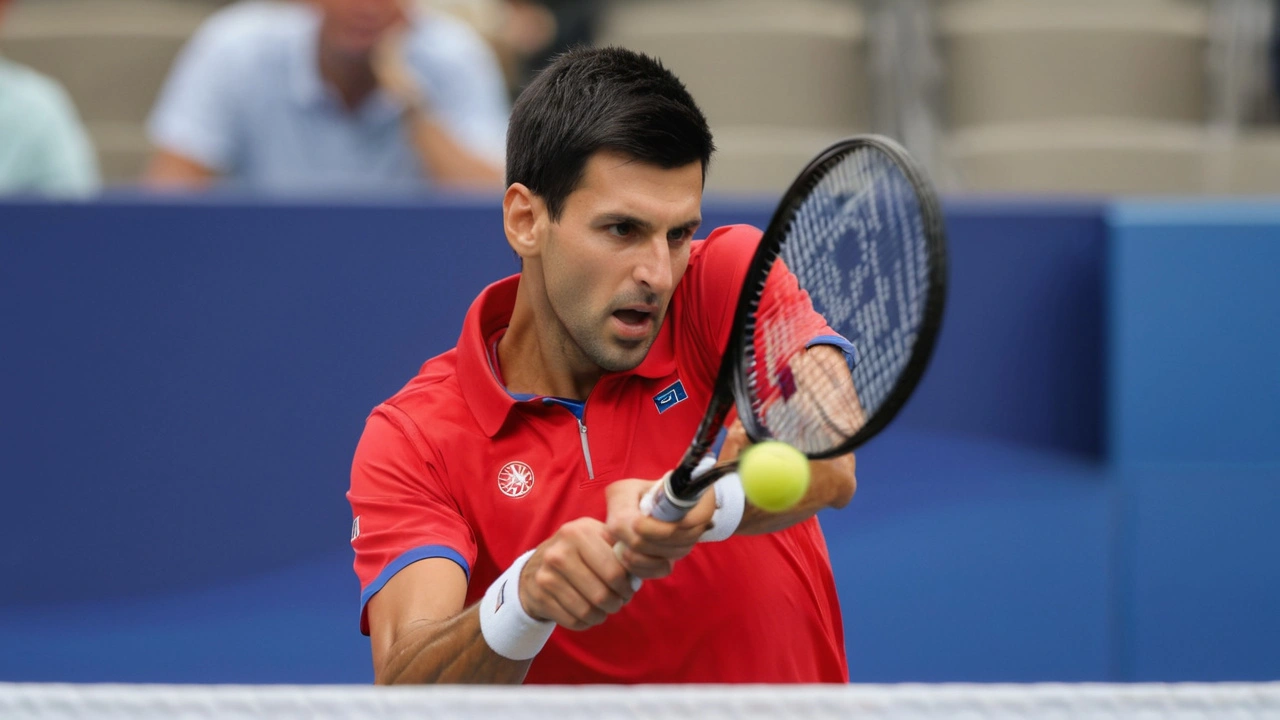2 Aug 2024
- 20 Comments
Djokovic's Worrisome Injury Scare
In the latest chapter of his illustrious career, Novak Djokovic has stirred apprehensions among his fans and followers by hinting at the possibility of withdrawing from the 2024 Tokyo Olympics. After navigating a challenging quarter-final against Stefanos Tsitsipas in Paris, the Serbian tennis icon is facing a troubling recurrence of a knee injury. This development is particularly concerning as it mirrors the meniscus tear he suffered earlier this summer at the French Open.
A Painful Déjà Vu
The 37-year-old champion's recent struggle began with a sharp pain in his right knee midway through the second set against Tsitsipas. Reflecting on the incident, Djokovic revealed that the sensation was eerily similar to the pain he experienced during the French Open, which later required surgical intervention. Despite the operation and his subsequent participation in Wimbledon, where he donned a protective sleeve over his knee, Djokovic's injury now threatens to derail his Olympic aspirations.
Stubborn Determination
In a display of unwavering determination, Djokovic has declared his intent to compete in the upcoming semi-final at Roland Garros, even against his medical team's advice. 'I am very worried, to be honest. I don’t know what to say. The pain was very strong for two games after it happened. I don’t know if I slipped or what happened,' he shared. Despite acknowledging the severity of his condition, the 24-time Grand Slam champion remains resolute in his commitment to represent his country.
'Even if [my doctor] says it's not okay, I'll probably get on the court and give it a try. These are very rare chances, to fight for a medal for my country, so I'm going to do everything possible in the next 24 hours to put myself in a position to fight for a medal for Serbia,' he emphasized, underscoring his patriotism and dedication.
The Quarter-Final Battle
The quarter-final clash against Tsitsipas was a testament to Djokovic's resilience. After a dominant first-set win of 6-3, the second set saw him trailing 3-0 and subsequently receiving medical attention for his knee. The intervention included an assessment by the on-court trainer and anti-inflammatory pills administered by a doctor. These measures enabled Djokovic to mount a comeback, eventually securing a tiebreak victory in the second set and advancing to the semi-finals against Lorenzo Musetti.
Hope Amid Uncertainty
'But that effect is going to fade away tomorrow morning,' Djokovic admitted, alluding to the temporary relief provided by the anti-inflammatory medication. He acknowledged the uncertain road ahead, stating, 'So I will have probably a more realistic picture tomorrow and hope for the best.'
Djokovic's semi-final opponent, Musetti, is no stranger to the Serb. The two have met in the previous two Grand Slam tournaments, with Djokovic prevailing at Wimbledon earlier this month but losing to Carlos Alcaraz in the final. Their encounter at the French Open was a marathon five-setter that extended into the early hours, demonstrating Musetti's capacity to challenge the world number one.

The Road Ahead
As Djokovic gears up for another showdown with Musetti, his focus remains on the immediate challenge as well as the broader aspiration of competing at the Olympics. His injury, however, casts an ominous shadow, raising questions about his capacity to endure the grueling demands of professional tennis. Fans and sports analysts alike are keenly observing his recovery and performance, hoping that he can surmount this latest hurdle.
The Serbian star's plight highlights the physical toll that professional athletes endure, often balancing the razor-thin line between competitive zeal and long-term health. Djokovic's willingness to push through pain for a chance at Olympic glory epitomizes the spirit of athletic dedication, yet it also serves as a poignant reminder of the vulnerabilities faced by even the greatest in the sport.
Concluding Thoughts
In the days to come, Djokovic's supporters will remain on tenterhooks, watching and waiting as he navigates this precarious juncture. The outcome of his semi-final will not only determine his immediate future in the tournament but also potentially influence his decision regarding the Olympics. For now, the tennis world holds its collective breath, hoping for a favorable turn of events for one of its most revered figures.


Karthik Nadig
August 2, 2024They’re hiding the truth about Djokovic’s injury – it’s a plot to sabotage Serbia’s medal hopes! 😡
Charlotte Hewitt
August 3, 2024Everything’s rigged from the top. The Olympic committee wants a cash‑grab and will pressure the Serb to sit out. They’re using his knee as an excuse to keep him off the podium and protect their own interests. Keep your eyes open.
Jane Vasquez
August 3, 2024Oh sure, because Djokovic cares more about a tiny flag than his own health – classic heroism! ;)
Hartwell Moshier
August 4, 2024Djokovic is a great player he’s hurting. Hope he gets better fast
Jay Bould
August 5, 2024Sending good vibes from India! Let’s hope he can still bring glory to Serbia without risking his career.
Mike Malone
August 5, 2024The phenomenon of elite athletes confronting severe musculoskeletal injuries during the pinnacle of their careers has long been a subject of clinical and sociological scrutiny. Novak Djokovic’s recent knee flare‑up, occurring in the throes of a grueling French Open quarter‑final, epitomizes the precarious balance between competitive ambition and physiological limits. Historical precedent demonstrates that even the most meticulously conditioned competitors are not immune to the cumulative stresses imposed by repetitive high‑velocity movements. In addition to the biomechanical strain, the psychological drive to represent one’s nation on the Olympic stage introduces an additional layer of compulsion. The Serbian contingent, emboldened by national pride, perceives the forthcoming Games as an opportunity to assert geopolitical relevance through sport. Consequently, the athlete’s decision-making process is imbued with external expectations that often eclipse personal health considerations. Medical literature advises a period of relative immobilization and targeted physiotherapy following meniscal insult to mitigate long‑term degeneration. Yet, the allure of an Olympic medal, a singular accolade in the annals of a player’s legacy, can prompt a deviation from evidence‑based protocols. The administration of anti‑inflammatory medication offers only transient symptomatic relief, as noted by Djokovic himself. Such pharmacologic interventions, while permissible under anti‑doping regulations, do not address the underlying structural compromise. A strategic withdrawal, albeit painful in the short term, may preserve the athlete’s longevity and preclude chronic arthritic sequelae. Conversely, persevering through pain may yield a fleeting triumph but risks irrevocable damage that could truncate future competitive endeavors. Observers must therefore weigh the immediate spectacle against the enduring welfare of a generation‑defining champion. It is incumbent upon the coaching staff, medical team, and indeed the athlete to prioritize a sustainable trajectory over a momentary glorification. In sum, the intersection of nationalistic fervor, personal ambition, and medical prudence creates a complex tableau that defies simplistic judgment.
Pierce Smith
August 6, 2024While the sarcasm is noted, it’s worth acknowledging the genuine pressure athletes feel when national expectations converge with personal health concerns.
Abhishek Singh
August 6, 2024Plot? More like a simple injury – no grand conspiracy, just a human body hitting its limit.
hg gay
August 7, 2024Seeing a top player like Novak struggle is tough for all of us who love the sport. It reminds us that even superstars have vulnerabilities that can’t be ignored. The pain he’s describing sounds intense, and it’s understandable he wants to push through for his country. Yet, the best way to honor that dedication might be to let his body heal fully before risking something permanent. Wishing him a swift recovery and hoping he can still chase that Olympic dream. 😊
Owen Covach
August 8, 2024Injuries are part of the game, no one is immune.
Pauline HERT
August 8, 2024Serbia needs its champion – the nation’s spirit rides on his shoulders.
Ron Rementilla
August 9, 2024From a performance standpoint, returning too soon could compromise his footwork and baseline stability, which are critical to his baseline‑dominant style.
Chand Shahzad
August 9, 2024Indeed, the balance between patriotic duty and personal health is a delicate equation, and your supportive words resonate across borders.
Eduardo Torres
August 10, 2024Regardless of any alleged schemes, athletes like Djokovic often find inner resilience that transcends external pressures.
Emanuel Hantig
August 10, 2024Reading this comprehensive analysis truly underscores the ethical crossroads athletes face, and it reinforces the need for compassionate decision‑making that honors both ambition and well‑being. 🙏
Byron Marcos Gonzalez
August 11, 2024One must appreciate the literary elegance with which you dissected the quandary, yet the visceral reality of a torn meniscus remains starkly unforgiving. 🤔
Chris Snyder
August 12, 2024From a medical perspective, a structured rehab protocol involving progressive load, proprioception drills, and controlled return‑to‑play criteria would be advisable before any Olympic contention.
Hugh Fitzpatrick
August 12, 2024Sure, the ‘grand conspiracy’ is just the knee reminding us that even legends can’t outrun biology.
george hernandez
August 13, 2024Coaching philosophy dictates that we must prioritize the athlete’s longevity; thus, integrating periodized training cycles that accommodate healing phases can sustain peak performance for future tournaments while honoring the current Olympic aspiration.
bob wang
August 13, 2024Indeed; the eloquent exposition captures the gravitas of the situation, and one can only hope for a judicious resolution. 😊